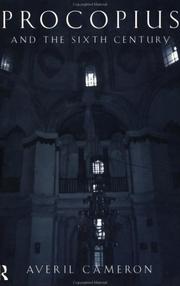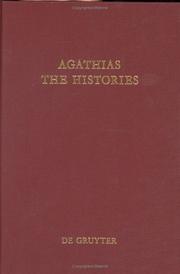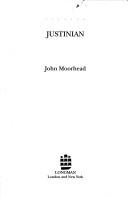| Listing 1 - 10 of 26 | << page >> |
Sort by
|
Book
ISBN: 1785431412 Year: 2015 Publisher: London : Copyright Group,
Abstract | Keywords | Export | Availability | Bookmark
 Loading...
Loading...Choose an application
- Reference Manager
- EndNote
- RefWorks (Direct export to RefWorks)
Justinian I --- Emperor of the East --- 483?-565 --- Byzantine Empire --- History --- 527-565
Book
ISBN: 9780199362745 0199362742 Year: 2018 Publisher: New York (N.Y.) : Oxford university press,
Abstract | Keywords | Export | Availability | Bookmark
 Loading...
Loading...Choose an application
- Reference Manager
- EndNote
- RefWorks (Direct export to RefWorks)
"Between the fall of the western Roman Empire in the fifth century and the collapse of the east in the face of the Arab invasions in the seventh, the remarkable era of the Emperor Justinian (527-568) dominated the Mediterranean region. Famous for his conquests in Italy and North Africa, and for the creation of spectacular monuments such as the Hagia Sophia, his reign was also marked by global religious conflict within the Christian world and an outbreak of plague that some have compared to the Black Death. For many historians, Justinian is far more than an anomaly of Byzantine ambition between the eras of Attila and Muhammad; he is the causal link that binds together the two moments of Roman imperial collapse. Determined to reverse the losses Rome suffered in the fifth century, Justinian unleashed an aggressive campaign in the face of tremendous adversity, not least the plague. A briskly paced narrative by a master historian, Rome Resurgent promises to introduce readers to this captivating and unjustly overlooked chapter in ancient warfare."-- This book offers a fundamentally new interpretation of his conquest policy and its overall strategic effect, which has often been seen as imperial overreach, making the regime vulnerable to the Islamic takeover of its richest territories in the seventh century and thus transforming the great Roman Empire of Late Antiquity into its pale shadow of the Middle Ages. In Rome Resurgent, historian Peter Heather draws heavily upon contemporary sources, including the writings of Procopius, the principal historian of the time, while also recasting that author's narrative by bringing together new perspectives based on a wide array of additional source material. A huge body of archaeological evidence has become available for the sixth century, providing entirely new means of understanding the overall effects of Justinian's war policies. Building on his own distinguished work on the Vandals, Goths, and Persians, Heather also gives much fuller coverage to Rome's enemies than Procopius ever did.
HISTORY / Europe / Greece. --- Justinian --- 527-565. --- Byzantine Empire --- Byzantine Empire. --- History --- History, Military.
Book
ISBN: 9781529365382 Year: 2023 Publisher: London : Basic books,
Abstract | Keywords | Export | Availability | Bookmark
 Loading...
Loading...Choose an application
- Reference Manager
- EndNote
- RefWorks (Direct export to RefWorks)
"In the sixth century CE the East Roman (or "Byzantine") Emperor Justinian presided over nearly four decades of remarkable change. From his capital of Constantinople, he directed armies to re-conquer territories that had been lost to Roman control in the fifth century, while also taking on the neighboring superpower of Persia. Most histories of Justinian's reign focus on these military exploits, and on the unprecedented persecution of religious and sexual minorities that earned him the epithet "Demon King." In Justinian Cambridge historian Peter Sarris argues that the emperor's achievements were more fundamental and diverse. Justinian oversaw the formalization of Roman law, creating a body of law that survived into the Middle Ages and, to this day, forms the basis of legal systems across much of Europe. The same religious and moral agenda that earned him his reputation as a demonic tyrant also inspired him to seek to improve the lot of humbler members of Roman society, and especially of women, on behalf of whom his wife, the Empress Theodora, lobbied him persistently. The book also examines the vast impersonal forces that threatened to shake Justinian's empire to its very foundations, including a dramatic period of climate change and, most devastatingly of all, bubonic plague, which wiped out, by some estimates, half the population of Constantinople. Justinian provides a radical reassessment of an emperor's legacy and achievement. Even as Justinian sought to recapture Rome's past greatness, he paved the way for what would follow"-- Through his energetic reform program, and his energetic self-glorification, Justinian redefined what it meant to rule, providing a model of active statecraft to which future Byzantine and Holy Roman emperors, medieval kings, and even Muslim caliphs and Ottoman sultans, would aspire. And yet, in recasting Roman society as an "Orthodox Republic," one in which his vision of the true Christian faith would prevail, Justinian laid the foundations for the exclusions and persecutions that characterized Medieval Christendom. Drawing on the latest scholarship, Justinian provides a panoramic history of the emperor's life and reign, shining new light on both the context of Justinian's program of imperial renewal and his true priorities. Justinian aimed to restore the majesty of the Roman Empire and the power of the emperor, whom he believed to be appointed by God.
Emperors --- Emperors. --- HISTORY / Middle East / General. --- Justinian --- 527-565. --- Byzantine Empire --- Byzantine Empire. --- History
Book
ISBN: 0521520711 0521817463 9780521520713 9780521817462 9781139000857 Year: 2005 Publisher: Cambridge: Cambridge university press,
Abstract | Keywords | Export | Availability | Bookmark
 Loading...
Loading...Choose an application
- Reference Manager
- EndNote
- RefWorks (Direct export to RefWorks)
Byzantine Empire --- Empire byzantin --- History --- Civilization --- Histoire --- Civilisation --- Justinian I, 527-565 --- Justinianus --- Flavius Justinianus --- Petrus Sabbatius --- Sabbatius, Petrus --- Justinianus, Flavius --- Byzantine Empire - History - Justinian I, 527-565 --- Justinien I (empereur d'Orient), 0482-0565

ISBN: 0415142946 9780415142946 Year: 1996 Publisher: London: New York: Routledge,
Abstract | Keywords | Export | Availability | Bookmark
 Loading...
Loading...Choose an application
- Reference Manager
- EndNote
- RefWorks (Direct export to RefWorks)
Procopius. --- Byzantine Empire --- Intellectual life. --- History --- Historiography. --- Historiography --- Procopius --- Intellectual life --- Procopius m. Caesareae --- Byzantine Empire - Intellectual life --- Byzantine Empire - History - Justinian I, 527-565 - Historiography

ISBN: 3110033577 3110826941 9783110826944 9783110033571 Year: 1975 Volume: 2A Publisher: Berlin: de Gruyter,
Abstract | Keywords | Export | Availability | Bookmark
 Loading...
Loading...Choose an application
- Reference Manager
- EndNote
- RefWorks (Direct export to RefWorks)
The Histories
-Goths --- Goths --- Goths in Italy --- Byzantine Empire --- History --- -Byzantine Empire --- Empire byzantin --- Histoire --- Goths - Italy --- Byzantine Empire - History - Justinian I, 527-565

ISBN: 0582063035 0582063043 Year: 1994 Volume: *6 Publisher: London New York Longman
Abstract | Keywords | Export | Availability | Bookmark
 Loading...
Loading...Choose an application
- Reference Manager
- EndNote
- RefWorks (Direct export to RefWorks)
Emperors --- Empereurs --- Biography --- Biographies --- Justinian --- Byzantine Empire --- Empire byzantin --- History --- Histoire --- Biography. --- Justinien, --- Justinian, --- Justinianus, Flavius Anicius Julianus, --- Justinianus --- Giustiniano, --- Iustinianus, Flavius Petrus Sabbatius, --- I︠U︡stinian, --- I︠U︡stinian, Flaviĭ, --- Justinian I, 527-565 --- Justinian I --- Justinian - I, - Emperor of the East, - 483?-565. --- Emperors - Byzantine Empire - Biography. --- Byzantine Empire - History - Justinian I, 527-565. --- Юстиниан, --- Юстиниан, Флавий,
Book
ISBN: 9783406559938 340655993X Year: 2007 Volume: III, 6 Publisher: München C.H. Beck
Abstract | Keywords | Export | Availability | Bookmark
 Loading...
Loading...Choose an application
- Reference Manager
- EndNote
- RefWorks (Direct export to RefWorks)
Rome --- Italy --- Italie --- History --- Politics and government --- Social life and customs. --- Civilization. --- Histoire --- Politique et gouvernement --- Moeurs et coutumes --- Civilisation --- Byzantine Empire --- Europe --- Empire, 284-476 --- To 527 --- Justinian I, 527-565 --- Empire byzantin --- 284-476 (Bas-Empire) --- Jusqu'à 527 --- 527-565 (Justinien I)
Book
ISBN: 9780748627912 074862791X 9780748627905 0748627901 0748631755 1299105807 Year: 2013 Publisher: Edinburgh Edinburgh University Press
Abstract | Keywords | Export | Availability | Bookmark
 Loading...
Loading...Choose an application
- Reference Manager
- EndNote
- RefWorks (Direct export to RefWorks)
Outlines the significant developments in the period AD 363 to 565These centuries witnessed a number of momentous changes in the character of the Roman empire. Most obviously, control of the west was lost during the fifth century, and although parts of the west were reconquered in the sixth century, the empire's centre of gravity had shifted irrevocably to the east, with its focal point now the city of Constantinople. Equally important was the increasing dominance of Christianity not only in religious life, but also in politics, society and culture. A. D. Lee charts these and other significant
284-565. --- Byzantine Empire --- Byzantine Empire. --- Byzantinisches Reich. --- Rome (Empire). --- Rome --- Römisches Reich. --- History --- History.--eflch --- Rome--History--Empire 284-476. --- Byzantine Empire--History--Justinian I 527-565. --- History.--eflch. --- Empire byzantin --- Histoire --- Ancient, Rome. --- Byzantine Empire -- History -- Justinian I, 527-565. --- Rome -- History -- Empire, 284-476.
Book
ISBN: 9781317075486 131707548X 9781472466044 1472466047 1317075498 9781317075493 9781315602288 9781317075479 9780367880767 Year: 2018 Publisher: Abingdon, Oxon ; New York, NY : Routledge, an imprint of the Taylor & Francis Group,
Abstract | Keywords | Export | Availability | Bookmark
 Loading...
Loading...Choose an application
- Reference Manager
- EndNote
- RefWorks (Direct export to RefWorks)
Presenting new literary and historical interpretations of the sixth-century writer Procopius of Caesarea, the major historian of Justinian's reign, this volume aims to encourage dialogue and collaboration between international scholars. Although scholarship on Procopius has flourished since 2004, when the last monograph in English on Procopius was published, there has not been a collection of essays on the subject since 2000. Work on Procopius since 2004 has been surveyed by Geoffrey Greatrex in his international bibliography; Peter Sarris has revised the 1966 Penguin Classics translation of, and introduced, Procopius' Secret History (2007); and Anthony Kaldellis has edited, translated and introduced Procopius' Secret History, with related texts (2010), and has recently revised and modernised H.B. Dewing's Loeb translation of Procopius' Wars as The Wars of Justinian in 2014. This volume capitalises on the renaissance in Procopius-related studies by showcasing recent work on Procopius in all its diversity and vibrancy. It offers approaches that shed new light on Procopius' texts by comparing them with a variety of relevant textual sources. In particular, the volume pays close attention to the text and examines what it achieves as a literary work and what it says as an historical product.
Historians --- History --- Historians. --- Historiography. --- General --- Procopius --- Procopius. --- Criticism and interpretation. --- 527-565. --- Byzantine Empire --- Byzantine Empire. --- Greece. --- Historiography --- 527-565 --- Prokopiĭ, --- Procope, --- Prokopios, --- Prokop, --- Procopius, --- Prokopi, --- Procopio --- Byzantium (Empire) --- Vizantii︠a︡ --- Bajo Imperio --- Bizancjum --- Byzantinē Autokratoria --- Vyzantinon Kratos --- Vyzantinē Autokratoria --- Impero bizantino --- Bizantia --- Procope --- Procopius Caesariensis --- Procope de Césarée --- Prokopios
| Listing 1 - 10 of 26 | << page >> |
Sort by
|

 Search
Search Feedback
Feedback About UniCat
About UniCat  Help
Help News
News